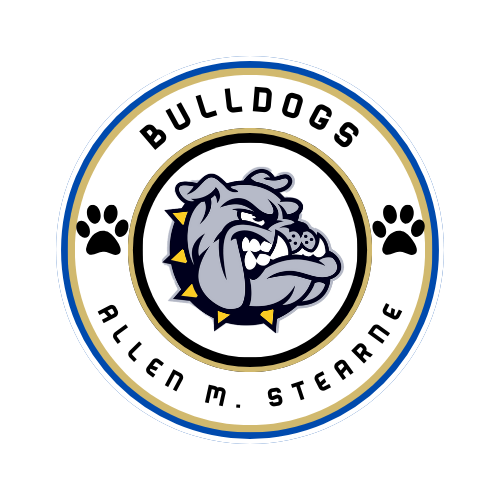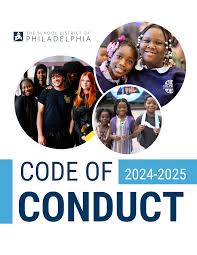Code of Conduct

School District of Philadelphia Code of Conduct
The School District of Philadelphia has adopted a Code of Conduct, available on our website. Teachers will review the contents of the code, especially the Levels of Offenses, and recommended interventions during the first days of school.
Student Discipline
All student discipline and outcomes are governed by the Philadelphia School District’s Code of Conduct, linked above. Any student found in violation of the Code of Conduct will face all disciplinary outcomes, as listed in the school disciplinary code.
Discipline, as a minimum, has three objectives in mind:
PRESERVE the optimum environment in which to deliver instructional services.
RESPOND to disruptive influences with corrective measures firmly and consistently while attempting to correct defiant behavior and keep disrupters in school.
REMOVE, as a last resort, the disrupters from the educational environment so that the majority may pursue their educational goals.
The School District of Philadelphia has the authority to make reasonable and necessary rules governing the conduct of students in school. As provided by Section 1317 of the School Code of the Commonwealth of Pennsylvania: Authority of Teachers, Vice Principals, and Principals over Pupils. Every teacher, assistant principal, and principal in the public schools shall have the right to exercise the same authority to conduct behavior over the pupils attending this school, during the time they are in attendance, including time required going to and from their homes, as the parents, guardians or persons in parental relation to such pupils may exercise over them. (Amended July 25, 1983, P.L. 315)
Discipline Process
When a student violates the Code of Conduct, parents/guardians can expect that their student will receive interventions and potentially other actions, such as suspension or a disciplinary hearing when appropriate.
Parents/Guardians can click HERE to find a list of all Code of Conduct behaviors, their definitions and the level of responses a student could receive (Appendix – Behavior Matrix: Page 23).
Suspensions
According to Pennsylvania law, suspension is defined as the denial to a student of the right to attend school and to take part in any school function for any period of up to ten (10) days. In the School District of Philadelphia, third through twelfth grade students may be suspended for violating the Code of Conduct. Kindergarten, first, and second grade students may NOT be suspended unless their actions result in serious bodily injury. Please note the following:
- Suspensions must be preceded by notification to the student and parent/guardian in writing.
- A parent/guardian conference must be scheduled to occur upon reinstatement.
- Suspensions cannot be appealed by parents/guardians. School administrators have discretion to issue suspensions in accordance with the Code of Conduct, following all parent/guardian conference procedures.
Conference Procedures
School administrators must adhere to the following procedures when scheduling parent conferences to address behavior:
- Notice of a conference must be provided to the parent/guardian in writing, in their preferred language and either hand-delivered to the home, sent by mail, email, or by other reasonable means.
- Interpretation will be provided for the conference, when requested.
- School administrators will discuss the behavior/incident and offer supportive services as needed.
- Parents/Guardians may request a copy of student records and any evidence.
- Statements must be redacted before they can be provided to the parent/guardian.
- Photographs and video recordings of incidents may be shown but copies cannot be provided.
- School administrators will inform parents/guardians of any further disciplinary action and provide an overview of due process rights regarding disciplinary action.
- Parents/Guardians are expected to attend all scheduled conferences and school administrators should make every attempt to engage them so that they are able to participate in-person or virtually, as needed.
Disciplinary Hearings
Students who are exhibiting a pattern of disruptive behavior(s) and/or committed serious violation(s) of the Code of Conduct may be referred to the Office of Student Rights and Responsibilities for a disciplinary hearing, after suspension. Prior to making a referral, schools must complete a Behavior Performance Review (BPR) for general education students to determine if the student is thought to have a disability.
NOTE: Disciplinary Hearing Referrals only apply to students in grades six (6) through twelve (12). Students in kindergarten through grade five (5) cannot be referred for a disciplinary hearing or receive a disciplinary transfer.
Disciplinary Hearing Process
Students referred for a disciplinary hearing will be suspended and provided with due process. Students have the right to return to school pending the outcome of the hearing, unless they receive a safety interim placement. Please refer to the Student Behavior and Discipline section of the Code of Conduct for more information.
Disciplinary hearings will be conducted by an impartial Restorative Discipline Liaison/Hearing officer.
Hearing Decisions
The impartial Restorative Discipline Liaison/Hearing officer will consider all evidence, dialogue in the hearing, and a student’s academic, behavior and attendance records when making a decision on the outcome. The outcomes could include 1) remaining in current school placement, 2) transferring to another SDP placement, or 3) transferring to an Alternative Education for Disruptive Youth (AEDY) program to address behavioral goals.
Alternative Education for Disruptive Youth Program (AEDY)
Pennsylvania’s Alternative Education for Disruptive Youth Program (AEDY) provides a combination of intensive, individual academic instruction and behavior modification counseling in an alternative setting to assist students in returning successfully to the regular education setting.
AEDY Transition Programs provide education to students in grades 6-12 who have been removed from the regular education setting for certain disciplinary reasons. The District and the AEDY Program work with families to create behavioral goals based on their reason for placement and assessments. Once behavioral goals are met, students prepare to transition to the regular education setting with a transition plan.